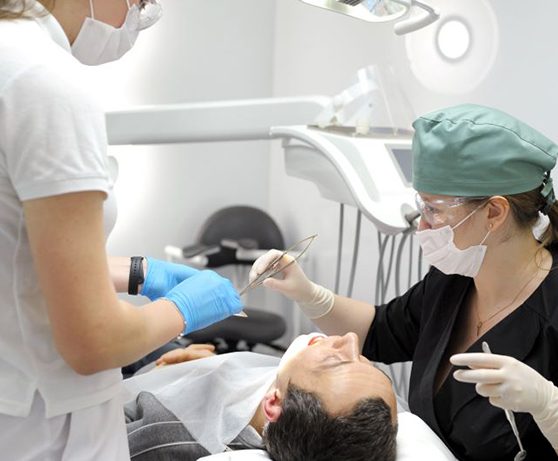Full Mouth Restoration – Reston, VA
Your Path Back to a Healthy Smile
When some patients visit us, they are struggling with a variety of complex or severe oral health problems. If that is true of you, there is no need to worry. Our team of experts can perform full mouth restoration services to get you on the path back to a healthy smile. With our skilled touch and empathetic approach to care, you can rely on us to go the extra mile to help you enjoy the best results possible. Read this page to learn more about full mouth restoration, and then contact our Reston office when you are ready to request a consultation.
Why Choose Northern Virginia Oral, Maxillofacial & Implant Surgery for Full Mouth Restoration?
- Skilled Team of Oral Surgery Experts
- Gentle, Comfortable, and Compassionate Care
- Advanced Technology for Superior Results
Is Full Mouth Restoration Right for Me?

If you find it difficult to chew your favorite foods, you are in constant oral pain, or you are embarrassed to smile due to obvious oral health problems, full mouth restoration might be right for you. This comprehensive, fully customized treatment plan can address a range of issues, including:
- Missing teeth
- Receding gums
- A weak jawbone
- And more!
During your consultation, we will thoroughly examine your mouth so we can understand your situation. From there, we will be able to start designing the steps on your journey to a stronger smile and an improved quality of life.
The Full Mouth Restoration Process

The full mouth restoration process starts with a consultation. We will take some X-rays or possibly use our CBCT machine in order to understand the health of your teeth and jawbone. We will learn about your overall health and ask you some questions about your expectations for treatment.
Following your consultation, we can get started on the treatment process. Your full mouth restoration might involve several procedures, such as:
- Tooth extractions to prepare your mouth for strong, sturdy replacement teeth.
- Bone grafts or a sinus lift to build the strength and size of your jawbone.
- Soft tissue grafts to replace lost gum tissue.
- Dental implant placement to rebuild lost teeth.
- Additional services performed by either your general dentist or another specialist.
Depending on the details of your treatment plan, full mouth restoration may take several months to complete. Our team always strives to work as efficiently as possible.
Understanding the Cost of Full Mouth Restoration

The cost of full mouth restoration varies from patient to patient. It depends on which procedures are included in your treatment plan, as well as the extent of those procedures. During your consultation, we can share some specific numbers with you. We do not want you to run into any unpleasant surprises when you are paying for your care! We welcome dental insurance, and we will be happy to help you file your claims. You can also ask us how you can apply for low-interest financing through CareCredit.
Full mouth restoration might seem expensive at first, but it is a worthwhile service that can set you up for decades of healthy smiles!
Full Mouth Restoration FAQs
We understand that full mouth restoration is a big commitment. You may not want to move forward with your consultation until after you have gathered more information. Of course, you are always welcome to call our team; we love to chat with both current and prospective patients. In the meantime, you may gain some valuable insight by glancing through the FAQs listed below.
How Long Does Full Mouth Restoration Take?
The timeline for full mouth restoration varies from case to case. Some treatments, such as dental implants, require several months to complete. Others, such as extractions, can usually be completed in a single appointment (for patients who require many extractions, we sometimes complete the procedure over a couple of appointments).
During your consultation, we will be able to give you a rough estimate of your treatment timeline. We strive to perform full mouth restoration as efficiently as possible so you can enjoy your results without any unnecessary delays.
How Long Will My Full Mouth Restoration Results Last?
The results of full mouth restoration should last for a long time. For example, with proper care, dental implants have the potential to last a lifetime. The results of tissue grafts can also endure indefinitely.
You can protect the results of your treatment by taking excellent care of your oral health. For example, you should visit your general dentist for routine checkups, adhere to a thorough oral hygiene routine, and eat a reasonable, balanced diet.
Does Getting a Full Mouth Restoration Hurt?
Thanks to sedation and local anesthesia, any procedure you undergo should be fairly comfortable. After the anesthesia and sedation wear off, it is normal to experience some soreness. Depending on the extent of the procedure, the discomfort might last anywhere from a few days to a few weeks.
You can facilitate an easy recovery process by closely adhering to any post-op instructions we provide. For example, we might encourage you to get plenty of rest, eat a soft diet, and take appropriate doses of pain medication.
Can I Get a Full Mouth Restoration if I Smoke?
Candidacy for oral surgery procedures is determined on a case-by-case basis. Whether or not you smoke is just one factor that our team will take into account.
While smoking will not automatically disqualify you from full mouth restoration, it is important to note that the use of cigarettes can slow down your body’s healing process and greatly increase your risk of post-op complications. We strongly encourage patients to quit smoking prior to their procedures. Your general physician may be able to provide resources to help you kick the habit.
Do I Need Full Mouth Restoration?
You might need full mouth restoration if you are struggling with complex or severe dental health problems, such as multiple missing teeth, severe decay, advanced gum disease, or other troublesome issues.
Full mouth restoration is not usually for people with strong teeth, healthy gums, and a well-aligned bite.
If you are unsure of whether this service is suitable for you, call us to book a consultation. Our experienced team will be happy to recommend your next steps.
Will People Be Able to Tell That I Had Full Mouth Restoration?
We do not want any of our patients to feel self-conscious about the way their smile looks. We carefully place dental implants in a way that minimizes the risk of your gums taking on a grayish color. When we perform gum services, we always keep aesthetics in mind.
As for your new crowns, bridges, or dentures, your prosthodontist or general dentist may be responsible for designing them. They will strive to create your new teeth in a way that complements your natural facial features. The materials used to make artificial teeth bear a strong resemblance to real tooth enamel.
In other words, it is unlikely that anyone will be able to tell that you have had some restorative work done on your smile!
I’ve Had Full Mouth Restoration – Is There Anything I Can’t Eat?
After any oral surgery, it is wise to eat a modified diet. Soft, non-spicy foods are usually best. For example, you may need to stick to eating things like eggs, yogurt, and smoothies while you are recovering.
Once you are fully healed, and your new teeth are in place, you should feel comfortable eating a wide variety of foods. In fact, with dental implants, no items should really be off-limits! You can feel free to indulge in things like fresh fruits and vegetables, grilled meats, and so much more.
Of course, a degree of caution is still in order. Just like natural teeth, dental implants and dental restorations (as well as the surrounding tissues) can incur damage if they are frequently exposed to hard, tough, sugary, or acidic foods.
How Do I Care for My Smile After Full Mouth Restoration?
Here are some tips to keep your new smile in good shape for as long as possible:
- Stick to a good oral hygiene routine. Brushing and flossing are both important! You should always be diligent about cleaning the area around your gumline.
- Eat a balanced diet. Try to avoid extremely hard foods. Sugary and starchy items should also be limited.
- See your general dentist every six months. Biannual cleanings and checkups can do much to prevent major oral health problems.
- Avoid bad habits. For example, you should not smoke, chew tobacco, or use your teeth as a tool to open packages.
